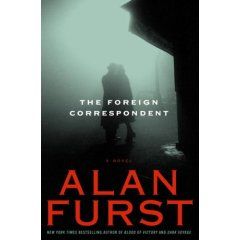Alan Furst's new spy novel

Politics & Prose, my favorite bookstore in the Washington area,hosted a special book event with Alan Furstto mark the publication of his new The Foreign Correspondent.Here is what Janet Maslin had written about it in the New York Times:
At the beginning of Alan Furst's new novel, the editor of a clandestine Italian anti-Fascist newspaper is assassinated. This is a terrible crime. But it could have been worse. The editor dies in Paris, in the midst of one of his Tuesday assignations with the wife of a politician, at the "rather subtle" Hôtel Colbert, a discreet place well-suited to "amours conducted between 5 and 7, those flexible hours of the early evening," though the editor and his mistress prefer a later hour. Never let it be said that Furst's urbane European spy stories do not know how to mix love and war.
The killing that sets "The Foreign Correspondent" in motion is quietly overseen by a silver-haired Italian count who wears a white wool overcoat, a gray silk suit, a Maltese cross, and the insignia of the Italian Fascist party. He rides in a chauffeured, Champagne-colored Lancia and stays ensconced there while a squad of henchmen do the dirty work. Never let it be said that Furst lacks style, either.
In the prismatic group of Furst novels that have summoned different facets of wartime, "The Foreign Correspondent" is not the most exotic. That is because its main character is a journalist: Carlo Weisz, an Italian raised in Trieste, which was an Austro-Hungarian city before 1919. With an ancestry already complicated in terms of nationality and with great ability to move quietly among the trouble spots of late 1938 (among them Berlin, Genoa and Prague), Carlo has a wide window on history in the making. Though he functions as an operative of the Italian resistance, he is primarily an observer as this book unfolds.read more
And when you read Furst's novels, especially those taking place in German-occupied Paris, try listening to Django Reinhardt's Swing 39.
Comments